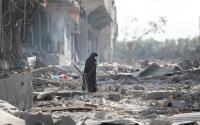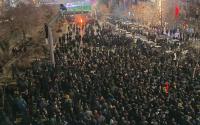Common Dreams / Published on Monday, April 11, 2005 by the Agence France Presse
In the photograph, 12-year-old Mohammed Tahir looks barely conscious. A bloodied rag covers his left hand, where the kidnappers hacked off his finger and sent it, along with the picture, to his family.
"We are not Muslims. We don't know God, so don't ask us for sympathy. Just send us money," the ransom note read.
His family begged and borrowed the 10,000 dollars the kidnappers asked for, but two days after they left the money in an abandoned school in the southern city of Kandahar, his battered body was found nearby.
In another incident blamed on the same gang, 13-year-old Nakibullah's body was unrecognisable when he was found nine days after his family paid kidnappers the same amount for a ransom.
Wild animals had destroyed his face and right arm, and only the missing finger on his left hand showed who he was.
"When we went there and I saw my son, whatever my feelings only I know, my heart knows and my God knows," said the boy's father Haji Bismillah, sitting in a room he has barely left since his son was found dead last month.
The boys were among six children kidnapped since the new year in Kandahar, once the spiritual heartland of the fundamentalist Taliban regime, according to the Afghan Independent Human Rights Commission (AIHRC).
The disappearances have sparked a political firestorm in the deeply conservative city. Many people have begun to feel life was better under the harsh Islamic law of the Taliban, because they could at least guarantee the safety of their children.
On March 7 more than 3,000 people took to the streets of Kandahar demanding the resignation of the governor and the police chief, accusing police of collusion with the kidnappers and demanding a restoration of law and order.
The protest turned violent. Three people were shot and another 15 were injured according to security sources and hospital doctors in the city.
Demonstrators have in part achieved their ends. On March 16, President Hamid Karzai ordered a sweeping shake-up of provincial police leaders and sent Kandahar's police chief Khan Mohammed to the northern city of Mazar-i-Sharif.
Karzai is right to be worried. The Taliban came to power in Kandahar after a similar spate of child kidnappings, when the now fugitive leader of the movement intervened to stop a fight between two militia commanders who were battling in the streets over a boy they wanted to sodomise.
According to one of the many urban legends surrounding the regime, the Taliban soldiers freed the boy and were welcomed by residents of the city.
But now people are worried about their children again.
"Three of the boys were abused and then murdered in the most violent ways. Two of them had been raped," Shamsuddin Tanrir, director of the Children's Rights Section at the AIHRC said about the latest spree of abductions.
According to Tanrir's records a further nine boys were kidnapped last year, and he suspects many more children were snatched but their parents have kept quiet after their offspring were returned once they had paid a ransom.
"A lot of children go missing. And Kuchi or Baluchi children whose parents are nomads and not part of the system are probably never traced," a western security source in Kandahar told AFP.
Afghan Independent Radio, which broadcasts a program in Kandahar city, reports that missing children declarations are the most commonly placed adverts on the show.
"We get about four or five missing children a month. About 20 percent of them are found before we hit the air," said Ismael Tahir, director of radio programming at the station.
However, others are taken for child labour, or abuse, or are runaways, Tahir said, adding that the station is planning to log their names and addresses to help with investigations.
The radio station is at the front line of the search for missing children because public confidence in the police has sunk so low. Even the newly appointed police chief, Lieutenant General Mohammed Ayoub Salangi, concedes that there was probably official corruption behind the kidnappings.
"It seems as if local militia or tribal commanders were involved," he told AFP.
For Mohammed Tahir's family their nightmare had only just begun when they lost their son. Police arrested two of the child's uncles, keeping one of them, Abdul Zahir, for 18 days and torturing him to try and force him to admit to the crime.
"I couldn't admit it because I haven't done anything, but now our whole family wants to leave Kandahar because we think there were powerful people involved," he said.
No police investigators have been to look at the pictures the kidnappers sent to try to find out who might be behind the killings, he added.
"It should be possible to work out where this was developed and try to trace the kidnappers that way," he said holding out a picture of his dead nephew.
Salangi said that police were still investigating the case, but while a handful of people were arrested and later released, no one has been charged.
"One of the biggest problems we face here is police corruption and judicial corruption. If the police can't find the real killer they will often arrest an innocent man and try and get him to confess," said AIHRC's Tanrir.
Abdul Zahir said he hopes things will improve under the new police chief Salangi, who is a Tajik from northern Afghanistan, rather than an ethnic Pashtun like the majority in Kandahar.
"We don't care if he's Pashtun, Tajik or an animal. We just want him to bring security," he said.






